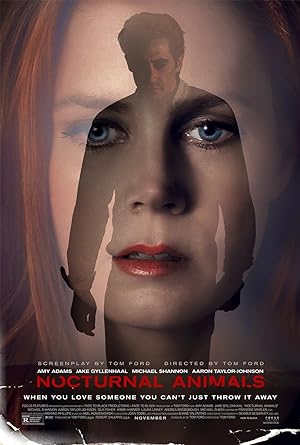Nocturnal Animals is the kind of film that artsy fartsy film lovers such as myself adore that leaves everyone else shaking their heads and asking, “What was THAT?!?” in a mixture of outrage, contempt and confusion. Tom Ford directs Nocturnal Animals, and the movie does itself no promotional favors by being extremely difficult to summarize in a few sentences, but I’ll try to anyway. Nocturnal Animals is about a wealthy art gallery owner who realizes that despite all external signs of success, her life is empty and meaningless. Her ex-husband from her younger days sends her a manuscript, which she reads. The experience leaves her feeling condemned and haunted by her treatment of him. Her attempts to find redemption yield no fruit, and she is condemned to a life alone with a guilty conscience.
I paid money to see Nocturnal Animals in the theater primarily because Michael Shannon is an American treasure who is taken for granted, but not by me, not anymore. Take my money! It also doesn’t hurt that Shannon and Ford are prominently not fans of 45. I also adore Jake Gyllenhaal, whom I have never seen give a bad performance, but always seems to bring something new to every role. I am also delighted to say that Amy Adams is having a banner year with Nocturnal Animals and Arrival (at least she made money off of Batman v. Superman: Dawn of Justice). I can’t imagine seeing Nocturnal Animals anywhere but on the big screen in a place that you cannot fully get comfortable surrounded by strangers. I feel as if it is important for a viewer to be like the main character in Nocturnal Animals who reads as if she is watching a movie: trapped, engaged, moved. Being able to pause or leave the screen or talk to someone else will take you out of the world(s) that Nocturnal Animals creates and invite your derision, which as Nocturnal Animals cautions, can lead to an unhappy, joyless life with only the veneer of art, not the passion.
Nocturnal Animals has a complex narrative, which includes the story unfolding on the screen of the life of the gallery owner and briefly her husband and daughter when she talks to them on the phone, the depiction of how she visually interprets what she is reading and her point of view of flashbacks of events that happened to her when she was younger. Visually the juxtaposition of how her daughter looks when she talks to her on the phone and how she sees the wife and daughter in the novel helps the viewer to understand that there are parallels, though not readily apparent, between her real life story with her first husband and the novel.
Nocturnal Animals is a gorgeous film to watch even at its grotesque or brutal moments. Not since Copycat have I been moderately jealous of a film character’s home, which was NOT the point of Nocturnal Animals, but sorry, I thought that it was coldly beautiful even though it was depicted as lifeless and remote. Ford really tackles Luke 9:25, “For what does it profit a man if he gains the whole world and loses or forfeits himself.”
S
P
O
I
L
E
R
S
Nocturnal Animals is actually an extremely political film and critique of the wealthy, specifically Ford’s people. In one flashback, there is a conversation between Adams and her first husband where she flatly condemns her wealthy, ambitious family for their racist, homophobic and bigoted ways. Even then, she lived in terror that she would become like her mother. While the parallels between her relationship with her first husband and the events of the novel are not precise, they exist. If the novel depicts an exaggerated stereotype of the worst that Texas has to offer, she gets that her first husband has morally equated her and her kind, the ancestors of the Hunger Games’ Capitol, with murderous, rapist meth heads. She does not get a pass for not getting her hands dirty if she stands with the bigoted and narcissistic wealthy.
The personal is political. Her escalating personal acts of betrayal to her soul (art), her husband (love) and her unborn child (her future) are small signifiers of the origins of wealth and corruption at root of her dismal life. Her convenience and ambition mattered more than art and love of her first husband and implicitly her gay brother and unborn child. Her wealth was the direct result of inhumane public policy that dehumanized other people and ultimately herself, which leads to self-destruction. She and her mother are no better than a guy unashamedly shitting on a toilet in his backyard. The stark visual contrast of the lifestyles may be an unbreachable chasm, but she and her first husband connect the dots.
Nocturnal Animals uses the device of reading a novel like the Old Testament uses a prophet telling a parable to a king to have the king condemn his behavior because no one else can effectively punish the unreachable. The art gallery owner is facing a financial apocalypse, another failed marriage, and a life alone. Nocturnal Animals also implies that her first husband and the vengeful widower in the novel, who are both played by Gylenhaal, are also consumed and destroyed in the effort to bring his perpetrator to justice.
Nocturnal Animals is a bleak, sumptuous and compelling tale of wrong choices and no redemption that deserves only open-minded viewers. Don’t watch it if you think that Nocturnal Animals sounds pretentious.
Stay In The Know
Join my mailing list to get updates about recent reviews, upcoming speaking engagements, and film news.





